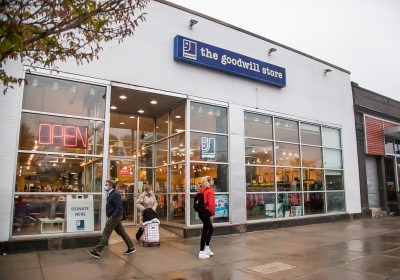For one night or even an entire weekend each year, students can transform into anything they want on Halloween.

This year, students turned to thrift stores to costume-hunt in an effort to prioritize sustainability and cost-effectiveness as the spooky holiday approaches.
“People buying single-use clothing for costumes that just get thrown away can have a very negative impact on our environment,” said Emilia Giovannini-Yarnell, a sophomore in the College of General Studies. “This cheap clothing just gets thrown back into the dumpster or it just sits there for years.”
A lot of people resort to buying “cheap costumes,” Giovannini-Yarnell said, knowing they will only wear it one time and throw it away.
“The material doesn’t break down so it just kind of sits and doesn’t do good things to our environment,” she said.
Stores like Spirit Halloween, Shein and Amazon practice the art of convenience — offering pre-packaged costumes for consumers to purchase or a quick stop shop for any costume item.
Having tried to avoid purchasing clothing from Shein, Lila Lucia, a sophomore in the College of General Studies, said she felt “guilty” about using the fast fashion company to buy her Halloween costumes in the past.
“People definitely use a lot of fast fashion companies because they’re cheaper and you get it quicker,” Lucia said.
During Halloween weekend, Lucia said there is definitely an expectation to dress up for multiple nights.
“People typically…don’t like reusing costumes,” she said. “You’re buying multiple costumes just to go out and party throughout the weekend.”
There is also an incentive from social media to not be “repetitive,” she said, because people post their costumes on Instagram to show off their creativity.
“Reuse costumes if you have multiple events with different people,” Lucia said. “I think there’s no shame in doing that.”
Brady Willis, a sophomore in the College of Communications, said that he buys costumes that can be reworn in his normal wardrobe to save money.
The idea of fast fashion is “crazy,” he said, because people buy clothes so often to only wear once and many will discard it instead of donating.
“It’s so much more sustainable to just…thrift something, maybe even, that you wear for Halloween and possibly, hopefully wear multiple times afterwards,” Willis said.
Willis said that he purchased four costumes for Halloweekend which were a mix of two thrift purchases from Goodwill, Buffalo Exchange and then two purchases off of Amazon.
Options like secondhand stores appeal to students like Giovannini-Yarnell as a more creative alternative — which, she said, is “more fun that way.” In addition to the Goodwill on Commonwealth Avenue, she said she likes to shop at the Garment District in Cambridge as well.
“They have their own costume store, but they also have a lot of rare, older items of clothing that can be dressed up,” Giovannini-Yarnell said.
Sal Genovese, a lecturer in natural sciences and mathematics in CGS, said during the holiday season, students should look for consumable goods that don’t “end up in trash piles.”
“The extractive process of our consumer goods has had a major impact on our ecosystems, especially due to the fact that there are nearly eight billion of us on the planet,” Genovese said.
James Harder, director of communications and public affairs for Morgan Memorial Goodwill Industries, said that Goodwill focuses on “sustainability,” “one of a kind costumes” and making costumes that can be reused after the holiday’s passed.
“You’re not going to find at Goodwill a lot of prepackaged costumes, but you will find outfits that can be put together, that may be the basis of your favorite movie or favorite book,” Harder said.
By taking clothing donations year round, Harder said Goodwill helps support the environment keeping things off the landfills.
Halloween takes on a “special meaning” however for students, he said, who are looking for innovative options for costumes that come at a “very affordable price” and are “environmentally friendly.”
Giovannini-Yarnell said “everyone should love Goodwill.”
“They have great options, and they even lay out clothes that people can use for their costumes if they’re going in looking for inspiration,” she said.
Costume culture can be interpreted in a lot of different ways, Giovannini-Yarnell said, some people see it from a creative aspect and some as “more of a means to party.”
“If you’re buying clothes you can wear every day, you can still make them more creative and costumey through your makeup,” she said. “Or find ways to DIY the clothes yourself to give them a more dramatic flair.”




